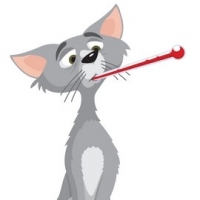
PET FOOD NEEDS TO BE HEALTHY!
by Nina Anderson
In light of the recent pet food recall, we encourage pet owners to read Super Nutrition for Dogs n’ Cats, a pertinent book that explains what is really in or missing from our pet food. Author Nina Anderson explains, “our favorite TV moose who appeared in the opening credits of “Northern Exposure” met his demise because of a mineral (cobalt and copper) deficiency in his diet. Normally moose in the wild live to be sixteen, but fed in captivity by humans, life expectancy is only six or seven years. This may in part be due to a mineral deficiency or imbalance, created by inferior food products and polluted drinking water. We have assumed an enormous responsibility to our household pets because we are the ones that supply their food and drink.” Unless they can catch a mouse, cats depend on their owner’s and the pet food manufacturers to create the best possible diet, but do they?
Veterinarians report that many of today’s pets suffer from allergies, skin problems, hypertension, heart disease, cancer, liver and kidney failure, to name a few. These conditions have been exaggerated by the “tainted” foods we feed our pets, and the lack of vitamins, enzymes, minerals and other nutrients. There are approximately eighty million pet owners in the United States. These animal lovers spend twenty seven billion dollars on their pets and of that, eleven billion is on food. Advertising in the pet industry is the primary way you hear about their products. Do manufacturers tell you what they put in their cans or boxes? Is it a dead dog or cat? That may sound harsh, but for some manufacturers, it’s true. “4D” is a an FDA classification denoting a dead, dying, diseased and disabled meat source. Do they tell you what effect the preservatives and additives may have on your pets health? Of course not! All you see is happy healthy animals lapping up their “yummy” food. Public demand for holistic approaches to pet care, have created a new industry in the health food marketplace. Manufacturers of natural pet foods have eliminated most, if not all, of the hazardous ingredients from their recipes and are now providing Fido and Fluffy with their own “health” food..
Having a good constitution is a major factor in our animal’s ability to defend itself against disease, but even an inherently weak constitution may be strengthened through gentle loving care and simple measures that enhance the immune system. Many new supplements have been created (or adapted from human products), that fight free-radicals, parasites, pathogens, virus and bacteria. Keeping your animal in tip top shape will assure fewer trips to the veterinarian. As we mentioned, feeding food without additives, “4D” meat sources, sugar and pesticides is a start. Cooking for your pet is always an option, but with most of us enduring hectic lifestyles, we depend on premium canned food or kibble, from a reliable manufacturer. Adding supplements is necessary, especially for pets that don’t forage on their own. Greens from wheat or barley grass, seaweed, kelp, blue-green algae, Chlorella and spirulina add needed protein and chlorophyll. Animals seek out fresh chlorophyll-rich plants in the backyard, which provides them with the ingredients necessary to build healthy blood, repair damage tissue, inhibit bacteria growth and act as an antioxidant. Indoor pets don’t have that opportunity, therefore green supplements are a welcome addition to their diet.
Since most pet foods are cooked or processed, vital enzymes have been destroyed by the heating process. Dr. Francis Pottenger discovered that enzyme deficient cats developed debilitating disease, such as arthritis, in teenage animals. Since all commercial pet foods are devoid of raw foods, i.e. enzymes, it would be wise to add an enzyme supplement to their food. Minerals are also in short supply. Our tap water most likely, is filtered, either at home or at the treatment facility which removes most of the minerals. The acid rain and current non-organic farming methods are depleting the soils of minerals, thus plants grown in these soils will also be mineral deficient, therefore adding minerals back into your pet’s diet is absolutely necessary. There are a variety of powdered supplements available, many containing minerals and other immune fortifying nutrients, such as bee pollen, kelp, nutritional yeast, garlic, lecithin, probiotics and vitamins. Holistic treatment for illness has also entered the pet market with herbal, homeopathic and flower remedies available, specific to pets. Garlic, for instance, is quite useful not only as a superb antioxidant and wormer, but animals who take garlic regularly seem to develop an odor, offensive to fleas. This becomes a wonderful alternative to those nasty toxic flea collars. Flower remedies are extremely useful for animals under stress, such as during travel, moving to a new home or when mourning the loss of an animal buddy.
We have received many stories from pet owners who have tried holistic treatments and natural foods supplements on their sick animals, with miraculous results. Animal lovers are finding that there is an alternative to drugs. Their stories, and information on nutritional approaches to pet care is included in Super Nutrition for Dogs n’ Cats. We have seen the natural foods industry grow tremendously in recent years. The natural pet industry is just starting to come of age. Their products are available in health food stores and natural pet stores now, and it is not far fetched to think that the pet chain stores will soon be stocking their shelves with natural supplements and “healthy” food.
-Nina Anderson is co-author with Dr. Howard Peiper of Super Nutrition for Dogs n’ Cats. Available at booksellers, and at www.safegoodspub.com
 Rabbit Care Calendar - Month By Month Care Advice For Your Rabbit
Rabbit Care Calen
Rabbit Care Calendar - Month By Month Care Advice For Your Rabbit
Rabbit Care Calen
 The Importance Of Companionship And Quality Time For Dogs
The Importance Of
The Importance Of Companionship And Quality Time For Dogs
The Importance Of
 Keeping Toy Dogs Happy
Keeping Toy Dogs
Keeping Toy Dogs Happy
Keeping Toy Dogs
 Gmo Ingredients In Dog Food - Some Common Myths
Gmo Ingredients I
Gmo Ingredients In Dog Food - Some Common Myths
Gmo Ingredients I
 Toxoplasma In Cats, Why It Is Important
Toxoplasma in Cats is pretty common and here I will exp
Toxoplasma In Cats, Why It Is Important
Toxoplasma in Cats is pretty common and here I will exp
Copyright © 2005-2016 Pet Information All Rights Reserved
Contact us: www162date@outlook.com